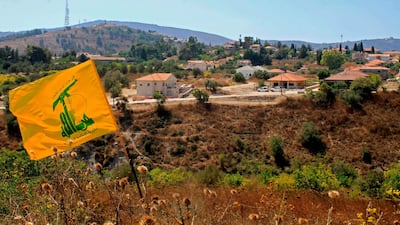After weeks of increasing threats between Hezbollah and Israel, Sunday's cross-border violence was subdued enough to allow both sides to claim they won.
Israel's military said "two or three anti-tank missiles" had been fired from southern Lebanon towards an army base and a military vehicle but caused no deaths or injuries.
They fired back with about 100 artillery shells and attack helicopters also struck the area.
Hezbollah, the pro-Iran Lebanese militant group, claimed the attack. It said its fighters had destroyed an Israeli army vehicle near the border in the same area. It said it had killed and wounded people inside, contradicting Israeli claims.
Both sides claimed victory after the attack, with Israeli Prime Minister Benyamin Netanyahu boasting his forces had not sustained “even a scratch”.
Mohanad Hage Ali, author of a book on Hezbollah, said that the operation had been about saving face and designed to avoid an escalation.
“Both sides are happy with the tit for tat and can move on,” Hage Ali said.
“Hezbollah lost two fighters [in Israeli attacks in Syria] so it is on the losing side. However, in Israel, peace was disturbed. People had to go into shelters and they heard explosions."
Hezbollah’s much-anticipated retaliation had been announced twice in the past week by leader Hassan Nasrallah.
It followed the death of two Hezbollah fighters in Syria in an Israeli attack on August 24, just hours before a drone raid against the group’s south Beirut stronghold, which they also blamed on Israel.
Both groups reached a tacit understanding after the month-long war in 2006 that they would not attack each other on their own territory. Instead they have been fighting in Syria.
Despite yesterday’s action, Hezbollah sent clear signals that it did not want an all-out war.
Sources told Reuters days before the attack that a calculated response was being prepared that would not lead to war.
Hage Ali said Hezbollah was well aware that Lebanon’s fragile economy could not stand the pressure of a new war, and most of the group’s 25,000 fighters were still fighting in Syria.
Hezbollah is the only Lebanese party that was allowed to keep its weapons after the end of the civil war in 1990, to protect the country from Israel.
Israel was not keen for an escalation either, with Mr Netanyahu vying for re-election on September 17. But Hage Ali said that things could change after the vote.
If Mr Netanyahu is re-elected, as polls suggest, he could decide to “launch a new attack and score against Iran and Hezbollah, which could permanently damage the Lebanese economy", he said.
But Lebanon could also avoid such an outcome by re-engaging with Israel on talks to agree on maritime borders that have been disputed for decades.
Those talks have failed to materialise despite announcements last June that they could begin soon under US and UN mediation.
Lebanon and Israel have had no diplomatic relations since they signed a ceasefire in 1949 after the Arab-Israeli war.
Another way for Lebanon to defuse the tension with Israel would be to move forward with its national defence strategy, Hage Ali said.
Discussions earlier focused on giving the Lebanese state more oversight on Hezbollah’s military operations and eventually integrating its fighters and weapons into the Lebanese army.
The ball is now in the court of President Michel Aoun, Hezbollah’s most important Christian ally.
“Hezbollah may not have yet shown interest but the president is capable of pressuring the group into joining negotiations,” Hage Ali said.







